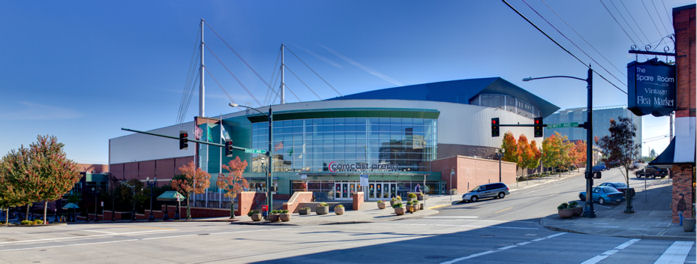We Can Help.
Snohomish County Bankruptcy Lawyers
Everett | Edmonds | Lynnwood | Marysville | Arlington
Everett Bankruptcy Lawyers
(425) 953-4364
The Law Offices of Jason S. Newcombe
Everett bankruptcy attorneys.
Contact us now for help.
Our Everett Bankruptcy Offices:
The Central Building
1721 Hewitt Ave
Ste #521
Everett, WA 98201
Contact an experienced Everett bankruptcy attorney today!
Drowning in debt? Help is available!
If you feel like you are drowning in debt and have no possible way of getting out of debt without putting a severe strain on your ability to have a normal, stable productive life, then you may want to look into your right to a fresh start through our nation’s bankruptcy laws. If so, our Everett bankruptcy lawyers are here to help you understand your rights and whether or not you can qualify.
Bankruptcy is an orderly, legal way canceling debt and allowing someone who owes someone else money (a debtor) to start over so they can support themselves and their families and not have to worry about their precarious situation turning into a full blown emergency. Our Snohomish County bankruptcy lawyers will fight to protect the legal and financial rights of you and your children.
Bankruptcy also puts creditors on notice of exactly what their chances of getting any money would be and how much that is if so in a quick and orderly process. If creditors receive anything it’s from the sale of property in a Chapter 7 case (though debtors losing any property in a Chapter 7 is much less common than not) or through regular payments through a Chapter 13 plan. Our Everett bankruptcy attorneys can explain this process in more detail when you contact us for additional information.

Our Everett bankruptcy lawyers can stop all collection actions immediately!
The power of the "automatic stay".
The second a bankruptcy is filed all debt collection has to stop. That means all the frantic efforts of your creditors to be the one creditor who actually gets some payments from a person in desperate circumstances has to stop. Period. The law is very clear on this front. Once a petition for bankruptcy is filed, ALL COLLECTION ACTIONS MUST CEASE IMMEDIATELY.
At this point, creditors have to accept their fair share or what a debtor can pay, if anything. In many cases, they just have to accept they will never get anything (which probably would have been the case for most of them anyway). However, it just takes one wage garnishment to lead to a financial disaster for a debtor and the debtor’s family. If you qualify, our Everett bankruptcy attorneys can stop almost any garnishment action immediately.
Examples of collection activity that stops immediately are garnishments, harassing phone calls, many license suspensions, foreclosures, repossessions and utility cut offs – all attempts to collect a debt. The order stopping collections is called an “automatic stay”. One of our Everett bankruptcy lawyers can explain the automatic stay in more detail when you contact our offices.
If creditors ignore the stay, they can be sanctioned by a bankruptcy judge. The stay is in place until the bankruptcy is over and the debtor receives a “discharge”. A discharge is a permanent federal injunction that prohibits creditors from ever collecting a debt again. If you continue to be harassed by your creditors, you should contact your Everett bankruptcy lawyer immediately.
Some debt cannot be discharged in a bankruptcy. Examples of debts you cannot discharge are student loans, some back taxes, back child support or alimony and fraudulently incurred debts. It is important to speak to a experienced Everett bankruptcy attorney about what debts will be discharged.
Debts like mortgages or car loans can be discharged but a debtor must continue to make these payments if they want to keep the property they are paying for. Often bankruptcies improve cash flow so a debtor can afford to pay a mortgage or a car loan because other debts, such as credit cards, are totally wiped out. Let our Everett bankruptcy attorneys help you get the new financial start you need.
Talk to an Everett bankruptcy lawyer today!
(425) 953-4364

Will I actually have to appear in court?
A good Everett bankruptcy lawyer should be able to keep you out of court in most circumstances. Most people who file bankruptcy will probably never have to appear in an actual bankruptcy court. Usually the only hearing they have to attend is their “meeting of creditors”. This meeting is conducted by a “trustee”, who is appointed in consumer bankruptcy cases. Creditors usually don’t appear at this hearing. It's usually a very simple and painless process, and one of our Everett bankruptcy lawyers will be by your side through the entire process.
It works like this. The debtor and his or her attorney appear and the trustee looks over the bankruptcy papers, which include statements of income, budgets, property, debt and other financial details. The debtor has to provide pay stubs, bank statements and tax returns before the hearing, which is held a month after filing. The debtor testifies and the trustee can make recommendations to the debtor and can file objections in bankruptcy court. A bankruptcy judge makes the final decisions in the case.
There are two types of bankruptcy cases for most debtors: a Chapter 7 bankruptcy and a Chapter 13 bankruptcy "repayment plan". If creditors are paid anything in a Chapter 7 bankruptcy, it is through taking property and liquidating (or selling it for cash) to pay creditors their fair share.
When you sit down with one of Everett bankruptcy attorneys, they will explain the differences between a Chapter 7 bankruptcy and a Chapter 13 bankruptcy in more detail. Most people in Chapter 7 do not lose any property because it is covered by “exemptions”, which exempt property because it is considered a necessity for the debtor to have an effective fresh start.
For example, 100% of retirement accounts are exempt and most cars and home equity is exempt. In Washington, we can use either the Washington state exemptions or federal exemptions depending on the situation. The Washington homestead, or home equity, exemption is $125,000 but the Washington exemptions leave less for other property. Our Snohomish County bankruptcy lawyers can help you determine which path is best for you based on several critical circumstances.
If this exemption isn’t necessary, the federal exemptions allow a large “wildcard” exemption, which can be used on any property, of $10,825 of unused homestead exemption. It is important to discuss property with an experienced bankruptcy attorney so you can get the most effective fresh start possible. The issues of the Washington homestead exemption and the wildcard exemption can be complicated. One of our Everett bankruptcy lawyers will be happy to explain these two issues in more detail during your initial consultation.

What about the new bankruptcy laws?
Bankruptcy and the new means test.
In 2005 Congress passed a law making it more difficult for people to qualify for Chapter 7. It established a means test, which measures income against expenses, to determine if there is enough money in the budget to pay at least a portion of the debt in a Chapter 13 repayment plan.
The expenses in the means test are a combination of real-world expenses, such as child support, mortgage payments and health insurance and standard expenses defined by law, such as food, clothes and transportation. The means test may seem complicated, and in some respects it is complex. But one of our Everett bankruptcy lawyers can easily help you work through the means test.
If the test shows some disposable income for creditors but the debtor files a Chapter 7 anyway, a creditor or the trustee can object to the bankruptcy and there is a presumption the debtor is abusing the system. The debtor can overcome this presumption by pointing out that there are special circumstances in their situation. The final decision on whether the debtor is abusing the bankruptcy laws is made by a bankruptcy judge.
If the debtor’s household income is less than the median, or average, income for their state, then they do not even have to fill out the means test. There is no presumption of abuse. The means tests looks at the income before taxes and other deductions are taken out and are updated regularly. Our Snohomish County bankruptcy lawyers know what to look for when performing the means test.
The means test only looks at the household income for the six months ending the last day of the month before filing. Timing can be very important in a consumer bankruptcy, especially for debtors with very unpredictable income, such as contractors or people who depend on infrequent bonuses or sales commissions. For this reason, it is important to consult a bankruptcy attorney for advice before fling a bankruptcy case.

Chapter 13 bankruptcy.
A Chapter 13 bankruptcy case involves a payment plan of three to five years. The plan can be complex and the trustee and creditors can object, arguing the plan does not comply with the bankruptcy laws. Very few Chapter 13 debtors who try to file their case by themselves succeed. If the means test shows disposable income, then the plan has to be five years.
Otherwise a debtor can try to complete the plan in three years if that pays creditors everything they have a right to, it fulfills the debtor’s goals and the debtor can afford it. Most debt can be paid in a Chapter 13 plans. This includes back child support, back taxes, tickets, back mortgage payments and car loans. Our Everett bankruptcy lawyers are highly skilled at crafting Chapter 13 plans that meet all legal requirements and that also work for you and your budget.
Even if a debtor does not have disposable income in the means test, many times a Chapter 13 is the best way to get out of debt for a particular debtor. For instance, you can stop a foreclosure and get caught up on payments over time in a Chapter 13. If you have some property that is not exempt but you want to keep it, often you can protect it by filing a Chapter 13 plan. One of our Everett bankruptcy attorneys can explain how this works when you contact our offices.
A Chapter 13 debtor can also strip a second mortgage off the title of their home if the value of the house is less than the balance on the first mortgage. Car loans can be made much more affordable in Chapter 13 by spreading out payments, Also, cars purchased over 2 ½ years ago or subject to title loans can be “crammed down”, which means a debtor pays the value of the car and pennies on the dollar for any amount of the loan over that.
Even if a debtor’s income is so high that they have to pay back all their debt in a Chapter 13 plan, it can make a lot of sense to deal with the situation in a Chapter 13. Creditors get paid depending on the claim they file with the bankruptcy court. If they do not file their claim in time, they miss their chance to collect anything. The amount they receive is fixed by the filing of a claim, so the debtor does not have to worry about interest and late charges. Again, one of our Snohomish County bankruptcy attorneys can explain this in more detail when you contact our offices. It sounds complicated, but it's really not.
There is a definite end to a Chapter 13 plan, unlike plans that hope to settle part of the debt or juggle creditors for years, hoping none become so impatient they sue. If you are sued and garnished, a creditor can take 25% of your after tax income which would be likely to result in a default on other debt, requiring a bankruptcy anyway.
Everett Bankruptcy Attorneys
Get the personal attention you deserve.
(425) 953-4364

Contact Us Now.
(425) 953-4326
Everett, WA Bankruptcy Lawyers
Stop all Harassing Phone Calls Now!
Assisting clients throughout Snohomish County

Everett Bankruptcy Attorneys
(425) 953-4326
Low Flat Fees
Flexible Payment Plans
Contact us today!
Our Everett bankruptcy lawyers are here to help.
The Problem: Financial stress and difficulties.
Are any of these happening to you?
- You cannot pay all of your bills, and everyone you owe money to wants you to pay it all back, right now.
- The mortgage company is going to foreclose on your home.
- Your bank account or your paycheck is being garnished.
- The IRS is about to levy on you.
- The bank called, and they want your car back.
- You and your family, friends, and boss, are getting phone calls from your creditors many times every day.
The Solution! What should you do?
Talk to an Everett bankruptcy lawyer today.
The first thing anyone in a difficult financial situation should do is to get the best information, and start figuring out solutions. We can help you, because our attorneys specialize in helping people with debts.
Our Snohomish County bankruptcy attorneys and debt relief lawyers are experienced professionals, and every day we help people get clear answers, and help them to get a fresh financial start. We help people get back on track.

Here are some of the most frequently asked questions we get:
What is Bankruptcy?
When Ben Franklin, Thomas Jefferson, and the other Founders of our country created the Constitution, they made sure to include the right to bankruptcy protection as one of your rights under federal law. This was because the old countries used to have debtors prisons, where people would go if they owed money.
You can imagine that this is not good in the long run, because how can people be good, contributing members of society if they are hiding from creditors, or are locked up in jail? People make mistakes in their investments. Or they get sick. Or they get laid off and find it hard to get another job.
The Founders of our country knew that things happen to decent, hardworking people, and they need to have a way out, and a way to get back on their feet. That is why Bankruptcy Law is one of your most important legal rights.
Do I qualify for Bankruptcy Under the New Laws?
Our experienced Everett bankruptcy attorneys have worked with thousands of people since the laws changed in 2005. We will go over the changes with you, and see if you qualify. If you have not filed a chapter 7 bankruptcy in the past 8 years, we probably can help you. Even if you have filed a chapter 7 in the past 8 years, we can look at other alternatives, such as a low-payment chapter 13 case.

How Can Bankruptcy Help Me and My Family?
Bankruptcy law is very powerful, and can:
- Stop foreclosures
- Stop repossessions
- Stop garnishments and lawsuits
- Stop the IRS
- Discharge judgments
- Discharge debts like credit cards, medical bills, even some taxes!
- Free up extra money each month, so you and your family can survive
What is a Chapter 7 Bankruptcy?
Chapter 7 is the most common kind of bankruptcy, and most of the bankruptcy cases filed every year are chapter 7 cases. To qualify for a chapter 7 bankruptcy, you cannot have received a discharge in another chapter 7 case filed in the past 8 years. You also must be able to show the court that you have no disposable income (that is, all of your income goes to pay basic living expenses like rent/mortgage, food, phone, utilities, insurance, gas, etc.)
It takes about 4 months altogether, and discharges unsecured debts like credit cards, medical bills, unsecured lines of credit, payday loans, personal loans, and even some income taxes. It does not discharge child support, fines or criminal restitution, most student loans, and most taxes.
It does not discharge secured debt like mortgages and car loans (unless you give up the house or vehicle). There are ways to change the contract balance and the amount of the payments on cars, jewelry, furniture, and other items, so be sure to ask us about this.
If you have many assets, like houses, cars that are paid off, or expect an inheritance or other financial benefit, let your Everett bankruptcy lawyer know right away. In some situations, you could lose things in a chapter 7 bankruptcy case, so we need to know about all of the assets in order to help you plan, or possibly do a chapter 13 plan instead.
That way you can be assured you can keep everything, or get experienced and professional help with pre-bankruptcy planning to minimize losses. Our Everett bankruptcy attorneys can help you determine if you can qualify for Chapter 7 bankruptcy protection and relief.
In a chapter 13 plan, your unsecured creditors, such as credit cards and medical bills, only get what is left over after catching up on your mortgage, car, your income taxes, child support or other higher priority debts.
Chapter 13 bankruptcies are also referred to as a "House Saver".
A Chapter 13 is known as a “house-saver” bankruptcy, because it can stop a foreclosure dead in its tracks, and give you a chance to catch up on missed payments and fees.
“Cram Downs”. You can use a chapter 13 to cram down a vehicle to what it is worth at current retail value, rather than what is owing on the contract. Our Everett bankruptcy lawyers can even change the interest rate. For some people, this can means a savings of thousands of dollars!
Mortgage Stripping. If you owe a lot more on your first mortgage than your house is worth, any junior liens like 2nd mortgages or home equity lines of credit may be able to be stripped off and discharged in a chapter 13 bankruptcy (this is not available under a chapter 7 case).
What about the tax man?
A chapter 13 plan can pay the IRS or other taxing agency back, and you can save on on interest and penalties. This can save hundreds or thousands of dollars, and the Court protects you while you make payments you can afford.
Need to free up additional income? A chapter 13 case can help you get your finances under control, and free up additional income each month for clothes, medical expenses and dental work, etc.- even a reasonable amount of money for entertainment!
Contact one of Everett, WA bankruptcy lawyers today.
Get answers. Find solutions. Get your life back on track.
Everett Bankruptcy Lawyers
Call now! (425) 953-4326
Low Flat Fees
Flexible Payment Plans